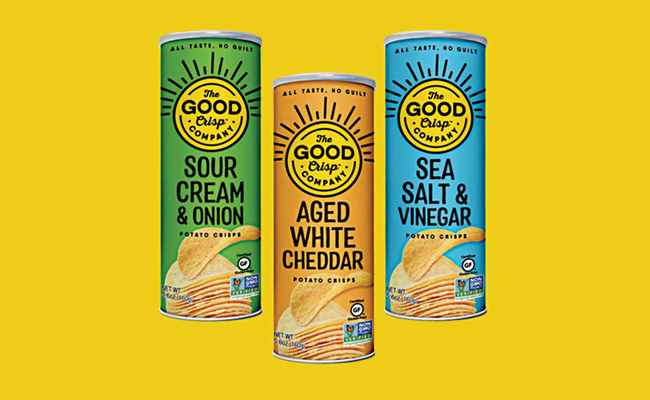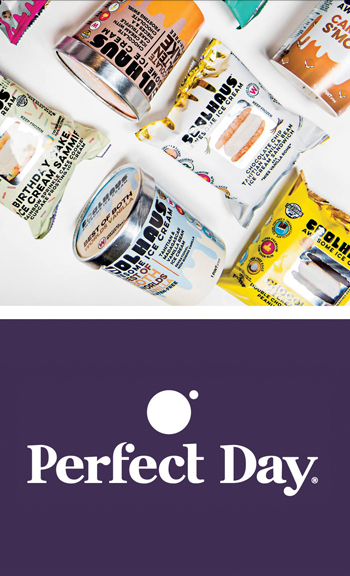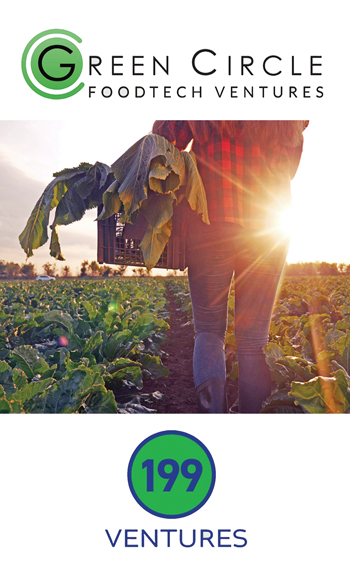NOSHscape: The Latest Food Brand News

Good Crisp Closes Funding To Push Into Conventional Retail
In December, salty snack brand The Good Crisp Company announced it has closed what it described as its largest funding round to-date as it seeks to make the jump from natural retailers into conventional grocery.
Good Crip CEO Matthew Parry declined to share the amount of capital raised, but said it was the company’s largest ever, coming roughly 18 months since it raised approximately $5 million in May 2020. Returning investors included CircleUp, Stonyfield founder Gary Hirshberg and Orgain founder Andrew Abraham, along with new participants including FF2032 (the venture arm of Lotus Bakeries), Vitality Capital, Goat Rodeo, RCV Frontline, Native founder Moiz Ali and Thrive Market founder Nick Green.
“Most of our [previous] investors have been angels or founders and really bring some expertise — I was really keen to continue along that model,” Parry said of the investor group. “For me, some real world experience is valuable.”
Parry said the capital is largely needed to help support the brand’s push into conventional grocery. The brand’s chips will launch into 1,500 Kroger stores in January as well as H-E-B, and its cheese balls, which were introduced in 2021 online and in smaller independent stores, will enter 2,700 Walmart locations in March. To support these efforts, the company, which currently has six full-time employees, plans to also invest in its field marketing, finance and sales teams.
“[It’s a] big leap from natural into conventional,” Parry said. “This is our first key [jump] into that so we want to make sure we are capitalized to be able to do that and really win in conventional like we have in natural.”
The funding will also help the brand further build its e-commerce business, he added, which currently accounts for 10% to 15% of sales.
Though there are plenty of traditional potato chip manufacturers, Parry said there are very few manufacturers who can produce canister chips, which have a different texture. Furthermore, Good Crisp’s exclusivity with Mamee for the North American market takes the number of co-packers even lower, he said.
In part because of this lack of competition, Good Crisp is able to command a price point of $3.36 to $2.99, roughly a dollar more than Pringles. The other part of the brand’s success, Parry said, has been the simplicity of its value proposition — especially amidst the sea of health claims and functional foods found on other grocery products.
Coolhaus Sells to Perfect Day, Will Transition to Entirely Animal-Free Offerings
Alt-dairy ingredient provider Perfect Day has reached an agreement to acquire ice cream brand Coolhaus from investment group Sunrise Strategic Partners for an undisclosed fee, the company announced in December.
The deal will make Coolhaus part of Perfect Day’s CPG arm, The Urgent Company, and transition its dairy-based line to use Perfect Day’s animal-free milk proteins in place of its current dairy-bases. The brand’s dairy-free products made with pea protein will remain the same.
Coolhaus CEO Natasha Case will also join The Urgent Company as its president of brand experience, while CFO Ryan Bennett will join as SVP of operations and integration. Other employees have been offered positions at Perfect Day or the Urgent Company as well, according to Paul Kollesoff, GM of The Urgent Company.
While the acquisition of one emerging brand by another may seem unusual, Steve Hughes, founder of Sunrise Strategic, said that the path to acquisition has shifted.
“Five years ago large strategics were apt to take flyers with emerging brands before they got the scale,” Hughes said. “If you want to sell to a strategic [now], you need to have $100 million in revenue and be making [over] 15% EBITA. I think the strategics have proven to themselves that they don’t have the fine motor skills they need to scale these emerging brands. So now, emerging brands have to be scaled brands to be attractive to them.”
Coolhaus will join The Urgent Company’s current slate of brands, including fellow ice cream brand Brave Robot, Modern Kitchen cream cheese and California Performance Co protein supplements – all of which use Perfect Day’s animal-free dairy ingredients. The consumer division has been on an innovation tear in recent months, launching cream cheese, baking mixes and sports supplements, as the previously announced integration of the Urgent Company into Perfect Day has begun to bear fruit.
Though Coolhaus, which is sold in more than 6,000 stores, and Brave Robot, available in over 5,000 stores, have some overlap in customers including Kroger and Sprouts, Coolhaus has its own unique relationship with Whole Foods Market. The retailer does not currently sell products made with Perfect Day proteins — which also cannot be classified as non-GMO because of their use of synthetic biology. Urgent Company executives said discussions with Whole Foods are ongoing but also noted that it will continue to produce Coolhaus’s pea protein-based ice cream.
Coolhaus also produces novelties using cookies and cones, and these too will eventually transition over to being “animal-free,” Kollesoff said. But, until then, only the ice cream will be vegan.
Despite their apparent similarities, Kollesoff broadly noted that Coolhaus seeks to “inspire the next generation of diverse creators …. [and create] ice cream for positive change,” while Brave Robot “exists to make more sustainable products without compromise.” As an example of further synergies, The Urgent Company said it plans to launch an exclusive animal-free dairy Coolhaus x Brave Robot co-branded novelty with “a key national retail partner.”
However, the agreement will give Perfect Day the ability to immediately place its brand on the packaging of a trendy ice cream brand, versus having to create a brand identity from scratch, as it has tried to do with Brave Robot. Perfect Day previously partnered with Graeter’s, but that brand tends to lean on its midwestern roots for branding and messaging.
The Urgent Company also noted that the acquisition will allow the two to share “resources and structure,” — though declined to provide specifics — which should result in efficiencies for both brands, a sentiment echoed by Hughes.
Green Circle Capital Launches Hormel-Backed Food Tech Venture Fund
In December, Green Circle Capital Partners announced it has raised $13 million for its first fund in a new venture capital division, Green Circle Foodtech Ventures (GCFV), with an anchor investment from Hormel Foods’ VC arm 199 Ventures.
The new investment vehicle will target early stage, innovative food tech companies working across a number of spaces, including food safety, sustainable packaging, sugar reduction, food waste and supply chain efficiency and – to a lesser degree – “tech-enabled” food and beverage brands. According to Green Circle founder and managing director Stu Strumwasser, the firm expects to write checks between $250,000 and $5 million per investment, with an average size of about $1 million, and will primarily participate in seed and Series A rounds.
Prior to the closing of the first fund, GCFV has already invested in two startups: California-based alternative protein company The Better Meat Co. and Israeli animal-free dairy protein maker Imagindairy. The firm is now aiming to grow its fund size to around $25 million.
Founded in 2013, Green Circle Capital is a New York-based investment bank focused on the natural products industry, including food, beverage and supplements, restaurants and – appropriately – foodtech.
According to Strumwasser, as GCFV marks an extension into principal investing for the firm, the new fund will only invest in technologies while Green Circle Capital will continue to service brands as a middleman for acquisitions and capital raises.
In addition to Strumwasser, GCFV’s partners include Graham Anderson, who brings experience in technology investing, and Green Circle Capital director Bakley Smith. Operational advisors include Green Circle associate Francesco Lorenzetti, Rao’s Specialty Foods CEO Eric Skae, Honeydrop Beverages founder David Luks and Explore Cuisine CEO Gregor Forbes.
The fund received an anchor investment from 199 Ventures, a division of global branded food company Hormel Foods. According to Strumwasser, Hormel’s involvement is a sign of the conglomerate’s dedication to plant-based innovations and sustainability.
In addition to Hormel, Strumwasser said several unnamed family offices invested in the fund. He noted that while GCFV’s initial fund may be smaller in the grand scheme of venture capital, portfolio brands will also have access to connections at Hormel and 199 Ventures or the family offices may provide additional sidecar investments.
While the food tech sector may be past its first inning, Strumwasser said it’s “still the second or third” and that “many of the best opportunities are still early stage.”
According to a 2021 report from Emergen Research, the global food tech market size was estimated at $220.32 billion in 2019 and is expected to reach $342.52 billion by 2027, at a CAGR of 6%. The growth is being driven by rapid adoption of new technologies within the food industry and pointed to new innovations in robotics, processing techniques and data technology as new growth opportunities.
“Food is the biggest industry in the world and it’s the least indexed for technology,” Strumwasser said. “And if that wasn’t gonna change, I thought there’s nothing I could do about it – I can’t start a revolution. But I started seeing that it looked like there was a revolution starting, and with that I thought that this is probably the biggest economic opportunity of my life, maybe, since the internet.”
In particular, Strumwasser said he is interested in fermentation technology, namely as a way to create better plant-based alternatives to meat and dairy products. That’s the tech at the heart of The Better Meat Co., in which Green Circle Capital invested in 2019, prior to the official formation of GCFV, and in October announced a partnership with 199 Ventures.
Strumwasser also pointed to shelf-life extension technology that can help reduce food waste, plant-based fat alternatives and plastic replacements as other areas of interest.


Receive your free magazine!
Join thousands of other food and beverage professionals who utilize BevNET Magazine to stay up-to-date on current trends and news within the food and beverage world.
Receive your free copy of the magazine 6x per year in digital or print and utilize insights on consumer behavior, brand growth, category volume, and trend forecasting.
Subscribe
